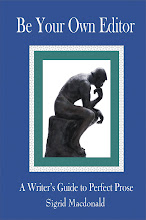Most
people who grow up in the US and use American English are not prone to
misspelling a word by using the Canadian variant; however, Canadian and British
folks often use their own language consistently in a document and then suddenly
spell one or two words the American way. How can they avoid doing that? Here
are the basic things to look for that differentiate American spelling from
British or Canadian.
One.
Words like honor, favor, and color all require a "u" in the British
or Canadian versions. For example, honour, favour, and colour.
Two.
Words that end in "er" such as center, fiber, or somber are spelled
with an "re" in British and Canadian English. For example, centre,
fibre, or sombre.
Three.
Participles that end in "ling" often necessitate an additional
"l." Think of dialing, traveling, and reveling (dialling, travelling,
and revelling).
Are these all the
differences between the three languages? Not by a long shot but these are some
of the big ones and if you can master them, you are well on your way to ensuring
that your blog, article, essay or novel is consistent in terms of spelling.
Sigrid Macdonald is
the author of three books, including Be
Your Own Editor http://tinyurl.com/7wnk5se and two erotic short
stories, which she wrote under the pen name Tiffanie Good. Silver Publishing
just released "The Pink Triangle," a tale of friendship, lust, and
betrayal. You can view her story here: http://tinyurl.com/6v65rgr


